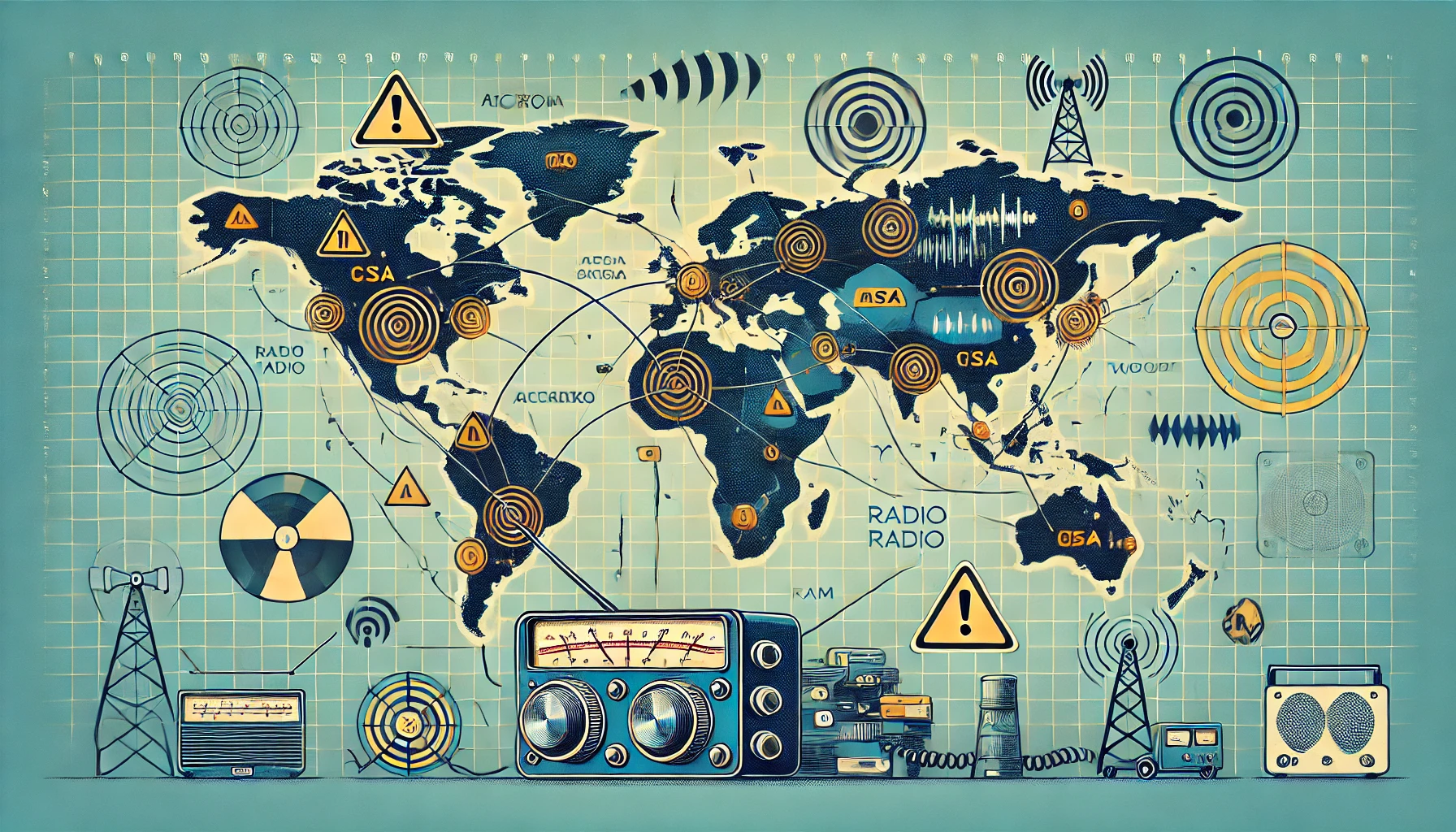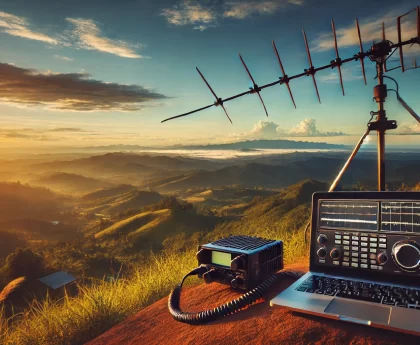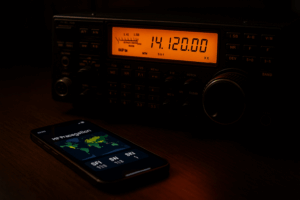Join our Exclusive Ham Radio Newsletter
Ham radio, or amateur radio, is a fascinating hobby that connects enthusiasts across the globe. While many countries embrace ham radio as a crucial tool for communication and emergency preparedness, others have strict, unusual, or downright bizarre regulations governing its use. From outright bans to strange licensing requirements, here’s a look at some of the weirdest ham radio laws around the world.
1. North Korea: The Ultimate No-Go Zone
If you were hoping to make contact with a North Korean ham operator, think again. North Korea is one of the only countries in the world that completely bans amateur radio. The government strictly controls all forms of communication, and unauthorized transmissions can lead to severe punishment. The only known exceptions have been temporary operations by foreign operators under extreme government supervision.
2. Yemen: No Ham Radio Without Special Permission
Yemen has some of the most restrictive laws on ham radio. Even though the country has previously issued amateur radio licenses, the process is lengthy, uncertain, and at times impossible. Operators must obtain special government permission, which has become nearly unattainable due to ongoing conflicts and political instability.
3. Cuba: Foreigners Need a Permit to Operate
Cuba allows amateur radio, but foreign operators must apply for a special permit before transmitting. Additionally, Cuban hams face restrictions on using internet-based digital modes, as the government regulates internet access and communication with the outside world. Despite this, Cuba has an active ham radio community, particularly involved in emergency preparedness and disaster response.
4. India: No Ham Radios in Vehicles
In India, mobile ham radio operation (using amateur radio in vehicles) is strictly prohibited. Unlike in many countries where mobile operation is common, Indian hams cannot legally transmit from a moving car. This law is meant to prevent unauthorized and potentially disruptive communication, but it also limits the hobby’s versatility for Indian operators.
5. Iran: Restrictions on Foreign Contacts
Iranian hams must adhere to a strict rule: they are not allowed to communicate with Israeli operators. Due to political tensions, Iranian hams risk losing their licenses or facing government scrutiny if they make contact with Israel. This is one of the few cases where international political conflicts directly impact amateur radio communication.
6. Myanmar: Ham Radio Was Banned, Then Allowed, Then Banned Again
Myanmar has a confusing history with ham radio regulations. For years, amateur radio was completely banned. In 2013, the government finally began issuing licenses, but political changes in 2021 led to a reversal, with new restrictions placed on operators. Many hams in Myanmar now operate in a legal gray area, unsure of whether they can continue their activities without government intervention.
7. Italy: No 6-Meter Band for a While
Italy is one of the few countries that temporarily banned the 6-meter band (50-54 MHz) for amateur use. For years, this band was allocated to military operations, making it off-limits to Italian hams. While restrictions have since eased, this unusual rule set Italy apart from most other European nations that had long enjoyed 6-meter operations.
8. South Korea: No DIY Radio Equipment
While South Korea allows ham radio, operators are prohibited from using home-built or modified equipment. In many countries, building your own transceiver is an essential part of the ham radio hobby, but in South Korea, all radios must be government-approved and commercially manufactured. This restricts many enthusiasts who enjoy the DIY aspect of amateur radio.
9. Egypt: Strict Government Oversight
Egypt requires amateur radio operators to get permission from the Ministry of Defense. Licenses are granted only to those who pass extensive security checks, and foreign operators must apply months in advance for temporary licenses. These strict controls stem from concerns about security and unauthorized communications.
10. Saudi Arabia: Women Were Once Banned from Ham Radio
Historically, Saudi Arabia prohibited women from obtaining amateur radio licenses. While this restriction has since been lifted, it was one of the more unusual ham radio laws in the modern era. Today, Saudi women can legally operate ham radio stations, but the country still enforces strict regulations on all amateur operators.
Conclusion
Ham radio is a globally recognized hobby, but its regulations vary widely from country to country. Some nations see it as a valuable tool for emergency communication and technical education, while others view it as a potential security threat. Whether you’re an aspiring ham or a seasoned operator, knowing the laws in different countries can help you avoid trouble while exploring the world of amateur radio.
Check our selection of Hamradio e-books
-
Sale!

Mastering APRS
Original price was: $59.99.$47.99Current price is: $47.99.
A Comprehensive Guide – ebook
⭐⭐⭐⭐⭐ -
Sale!

Mastering FT8
Original price was: $59.99.$47.99Current price is: $47.99.
A Comprehensive Guide to the Ultimate Digital Mode – ebook
⭐⭐⭐⭐⭐ -
Sale!

Stealth CB Antennas
Original price was: $59.99.$47.99Current price is: $47.99.
A Masterclass in Innovation and Disguise – ebook
⭐⭐⭐⭐⭐ -
Sale!

Ace Your Ham Radio Exam
Original price was: $59.99.$47.99Current price is: $47.99.
Technician, General, and Extra Class – ebook
⭐⭐⭐⭐⭐ -
Sale!

DMR for Hams
Original price was: $59.99.$47.99Current price is: $47.99.
The Ultimate Beginner’s Guide – ebook
⭐⭐⭐⭐⭐ -
Sale!

D-STAR, DMR & Fusion
Original price was: $59.99.$47.99Current price is: $47.99.
A Beginner’s Guide – ebook
⭐⭐⭐⭐⭐ -

Mastering the 6-Meter Band
$47.99
The Ultimate Guide – ebook
⭐⭐⭐⭐⭐ -
Sale!

Integrating Ham Radio with Modern Technology
Original price was: $59.99.$47.99Current price is: $47.99.
IoT, Raspberry Pi, and More – ebook
⭐⭐⭐⭐⭐ -
Sale!

D-STAR, DMR & Fusion
Original price was: $59.99.$47.99Current price is: $47.99.
Guia para Principantes – ebook
⭐⭐⭐⭐⭐ -
Sale!

Ham Radio for Preppers
Original price was: $59.99.$47.99Current price is: $47.99.
The Essential Survival Communications Guide – ebook
⭐⭐⭐⭐⭐ -
Sale!

Mastering Marine Radio
Original price was: $59.99.$47.99Current price is: $47.99.
A Sailor’s Guide to Confident Communication – ebook
⭐⭐⭐⭐⭐

Enter shop






